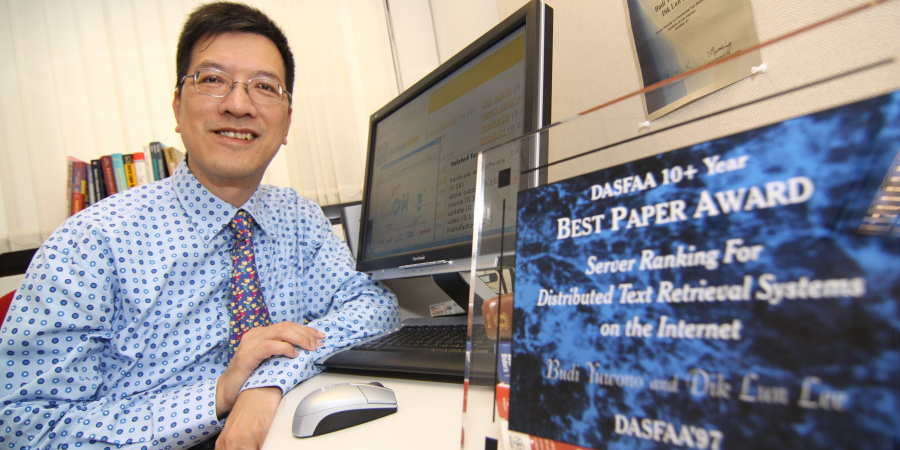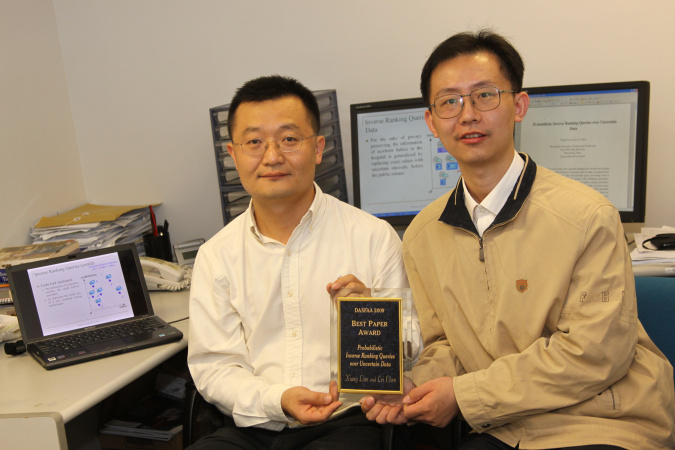Twin Wins for HKUST Faculty for Search Engine and Database Research
Two papers submitted by HKUST research teams have won two out of a total of three best paper awards at the 14th International Conference on Database Systems for Advanced Applications held in late April in Australia.
The first paper on how search engines should be run and developed has won for HKUST Professor in Computer Science and Engineering Dik Lun Lee and his doctorate student Budi Yuwono the inaugural DASFAA 10+ (Database Systems for Advanced Applications) Best Paper Award 2009.
Entitled "Server ranking for distributed text retrieval systems on the Internet", the paper was selected from more than 320 papers presented over a period of 10 years (1989 - 1999) at six DASFAA international conferences.
According to the selection panel, Prof Lee's paper "is one of the earliest papers on meta-search engine. It impacts on the current research topics on web server and distributed information retrieval and contributes to the development of server (collection) ranking method". The judgment was made after observing the paper's impact on the field for more than 10 years after its publication. The paper has generated an impressive 120 citations since its publication in 1997.
In mid 1994 when Prof Lee started his research on search engines, the development of search engine technology was still in its infancy. Two years into Google's emergence, the market was dominated by such "full text" search engine players as WebCrawler, InfoSeek and Lycos. Yet the observations and concepts that Prof Lee put forward in his paper have proved to be pivotal, original and time-proof, in particular its caution of the risks involved in relying on one big search engine for conducting web search work.
"This mode of operation hinges negatively on the protection of privacy, as well as on data screening, renewal and customization," Prof Lee said.
Instead Prof Lee advocates using a large number of collaborative search engines to perform searches on the web. "This mode of operation will help address the issue on privacy. It also gives the collaborative search engine operators and content owners the autonomy or ability to track usage and add or remove contents from the search engine anytime they want," said Prof Lee.
The second DASFAA Best Paper Award 2009 went to HKUST Assistant Professor in Computer Science and Engineering Lei Chen and his doctorate student Xiang Lian. Selected out of a total submission of 186 papers, this paper, "Probabilistic Inverse Ranking Queries over Uncertain Data," attempts to answer inverse ranking queries on imprecise data accurately and efficiently.
According to Prof Chen, "An inverse ranking query is to evaluate the ranking of an object, compared with its peers. This type of query has practical applications such as judging the health of a newborn baby from his/her weight and height by comparing with other babies, or helping a credit card company determine the credit limit of a new customer among other customers."
Prof Dik Lun Lee
Prof Dik Lun Lee is currently Professor in Computer Science and Engineering at HKUST. Prior to joining HKUST in 1994, he was Associate Professor in Computer and Information Science at USA's Ohio State University. He obtained his MSc and PhD degrees in Computer Science from the University of Toronto. Prof Lee is working on a research project on personalized search engine which tries to understand a user's viewing habit and rank the results according to the user's interest.
Prof Lei Chen
Prof Lei Chen joined HKUST in 2005 as Assistant Professor in Computer Science and Engineering. He received his PhD degree in Computer Science at the University of Waterloo. His research interests cover uncertain and probabilistic databases, multimedia databases, graph databases, and network databases.


